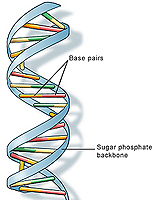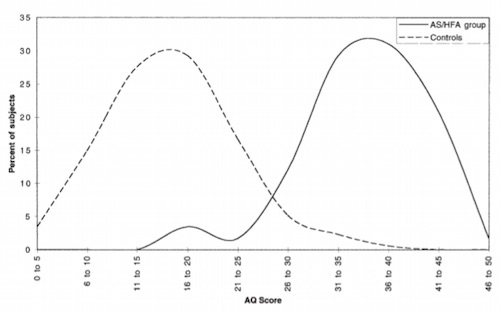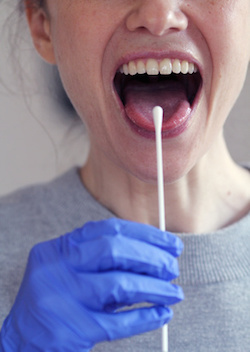Collecting DNA samples from 61 mathematics professors who have won international prizes, such as the Fields medal, might sound like the beginning of an airport thriller plot to clone genius. In fact this rare set of DNA samples is part of a novel research project being conducted by the Autism Research Centre (ARC). The project, Investigating mathematical talent and autism using genetics and epigenetics (IMAGE), is investigating the genetics of mathematical ability and the genetics of autism. "The novel approach to our study is to see whether the genes for autism, and the genes for maths, are entirely separate or if there is some overlap," says Simon Baron-Cohen, Professor of Developmental Psychopathology and the University of Cambridge and Director of the ARC.

The double helix of the DNA molecule has two strands, each of which is made up of four basic building blocks, denoted by the letters A, G, T and C. The order of these bases contains the instructions for an organism's development and functioning. (Image: US National Library of Medicine)
The idea of mathematicians being autistic, and autistic people being mathematical geniuses, might be familiar to you. Of course these are stereotypes and both of these groups are made up of all sorts of people: the mathematical community displays the full spectrum of neurodiversity and individuals in the autistic community work in all subjects, from art to the sciences, and in many different trades.
"Autistic traits exist in a bell curve in the population – we all have them," says Baron-Cohen. These traits fall into categories such as difficulties with communication or social interaction, having an excellent eye for detail, and a preference for doing one task at a time, in great depth. There's a reason why autism is described as a spectrum condition (and referred to as ASC for autism spectrum condition) – most of us will recognise some of the traits in varying degrees in ourselves. "It's just a matter of how many autistic traits you have and if they are interfering with your daily functioning as to whether you need a diagnosis."
What Baron-Cohen and his colleagues at the ARC would like to build on is their earlier finding that mathematicians on average have more autistic traits than a randomly selected population. Over the last 20 years they have consistently noticed a link between mathematical ability and autistic traits. For example, in a 2001 study of Cambridge students the team found that scientists had more autistic traits than humanities students: "We found higher rates of autism amongst the maths students compared to other disciplines. The scientists have more autistic traits than those in the humanities, and mathematicians an even higher rate than other scientists."

The ARC developed the autism-spectrum quotient (AQ) test to allow people to assess how many autistic traits they have. The bell curve on the right shows the distribution of AQ scores (which are out of 50) for people with a diagnosis of an ASC, compared to the curve on the left for a group of people without a diagnosis.
Exploring rich data
Autism is partly genetic, but not completely. "In twins where one of the twins has autism, the chances are higher that both will have autism if the twins are identical compared to if they are non-identical. But even amongst identical twins one can find that if one has autism the other may not, even though they share all of their genes," says Baron-Cohen. The first phase of the project explores the genetics of autism thanks to a very rare group of families.
These are multiplex families: nuclear families (parents and children) with three or more members having a diagnosis of an ASC. "From a research point of view, they are going to teach us a lot," says Baron-Cohen. The research team have identified 20 such families in the UK and Europe and have collected DNA samples from each family member. The next step is to completely sequence the whole genome of each of these family members, creating a rich data set on the genetics of autism.
The team has also put together a rare genetic resource to investigate mathematical ability. "Amazingly, no one has ever really looked in detail at the genetics of maths," says Baron-Cohen. As mentioned above, the team have collected DNA from 61 professors of mathematics or theoretical physicists from around the world, including individuals who have won an internationally recognised prize in their field, such as the Fields Medal. And like the genomes of the members of multiplex families, the whole genome of each of these talented mathematicians will be completely sequenced.
Baron-Cohen says that these two datasets provide an exploratory pool of genomes that will enable really rich research. This will become a shared resource: after this project has finished, with the consent of the participants, these data sets will be shared with other researchers online to enable future research.
Hunting for genetic clues
When a person's DNA sample is analysed, the process doesn't deliver their sequence on a plate. Instead, researchers are left with 4 billion DNA fragments, which need to be aligned to reveal the person's full sequence. The alignment involves some impressive mathematical magic, which you can read about in Solving the genome puzzle.
Once the genomes for these two groups are sequenced, the hunt begins for the interesting genes. "Initially we're going to look for rare genetic variants, unusual genetic variations that a group [the talented mathematicians or the multiplex families] have that are far less common in the general population," says Baron-Cohen. These might be mutations that occur at a rate of 2% among the talented mathematicians, but at less than 0.1% among the general population.
"With whole genome sequencing you can crawl along the genome and look at every base pair. But it's big data – there are 20,000 genes and millions of base pairs." Helena Brunel, the bioinformatician on the project, explains that machine learning techniques and mathematical algorithms are needed to find these rare variants within the mass of data. "We apply what is called a genetic association test," says Helena. "They are basically statistical tests that look at variations gene by gene. These are combined with a lot of machine learning techniques."
The plan is that the analysis of the DNA datasets from the multiplex families and the talented mathematicians will indicate which DNA variants may play a part in either the presence of autistic traits, or mathematical ability, in a person. Additionally, the researchers are interested to find out if there are gene variants that are shared by both communities.
How you can help
Once the researchers have identified gene variants of interest, they need some larger, independent populations to test their hypotheses on. This kind of genetic study, when you restrict your analysis to specific genes, is much cheaper than whole genome sequencing. "This is more affordable, and is a confirmatory approach. You have your hypothesis from the first group [the talented mathematicians or multiplex families] and then you try to confirm it in a second group," says Rosie Holt, who is coordinating data collection. And here is where UK maths students and university alumni are helping.
To explore the potential genes for mathematical ability the team is collecting DNA from students who are known to have high mathematical ability because they received As in their final school exams and have, or are studying for, a maths degree at a UK university. The team have already recruited 1200 such students, 800 of which have returned their DNA saliva kits, and they are working hard to get the number of returned kits up to 1000.
But the vital group in this study comprises those people who bring these two areas together: people with high mathematical ability and a diagnosis of autism. Because this is a rarer group, the researchers have widened their pool to include any students or alumni of a maths, physics, engineering or computer science degree. Their goal is to have 100 people return their DNA kits in this group.

You can help!
The team are still looking for volunteers. If you or someone you know would like to take part in the study you can get in touch at the project website.
The researchers hope that increasing our understanding of the role of genetics in autism will have benefits for individuals on the spectrum and their families. "We see autism genetics as helping to identify subgroups on the spectrum with distinct genetic causes, which may have a clinical benefit for similar families for joining support groups," says Baron-Cohen. "In theory, if genetics was part of diagnosis this could also lead to earlier detection with a view to earlier intervention."
The team also hopes to see if genetics provides evidence of Baron-Cohen's suspected link between mathematical ability and autism. Plus's anecdotal experience of autism is that it comes with a wide range of interests and abilities, so it would be useful to see if there is some science behind the stereotype.
And as for the genetics behind maths ability as exemplified in the talented mathematicians – will they find a gene for maths ability? This project is an exciting opportunity for UK maths students and alumni, both with and without ASC, to get involved in understanding these questions.